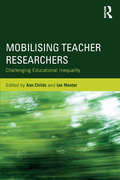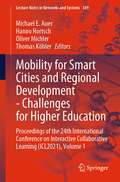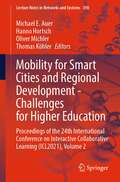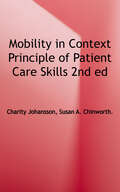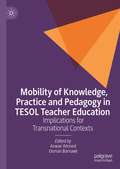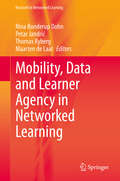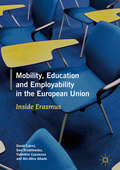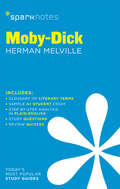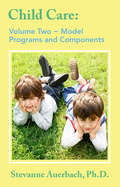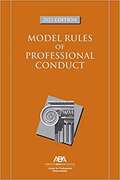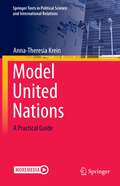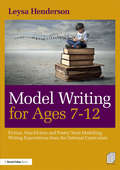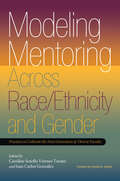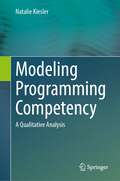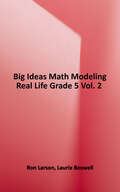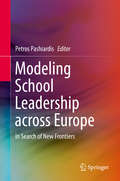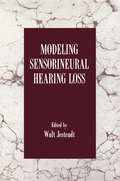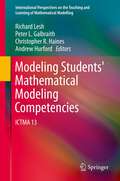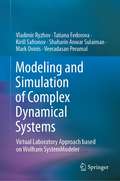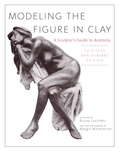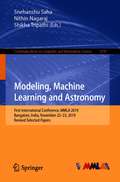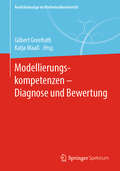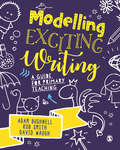- Table View
- List View
Mobilising Teacher Researchers: Challenging Educational Inequality
by Ann Childs and Ian Menter'[A] really important book […] the growth of interest in teachers in England taking part in educational research is significant.' – John Furlong, Emeritus Professor of Education, Oxford University, UK. Mobilising Teacher Researchers brings together the results of a research project carried out over a two-year period, commissioned by the National College for Teaching and Leadership and involving over 650 schools in England. An internationally renowned group of contributors present crucial and intriguing lessons learnt from the 'Closing the Gap: Test and Learn' project, aimed at identifying ways in which to close the attainment gap, raise the achievement of disadvantaged children in England, and introduce new research methods into schools. From the project’s policy origins to its implementation, the book captures the diverse range of outcomes from the project, both intended and unexpected. It reveals the ways and extent to which teachers were mobilised as researchers, and how analysis will impact on the future of research-informed practice in schools. This resulting collection of evolutionary debates focuses on topics such as new forms of governance, teacher engagement and the effectiveness of Randomised Controlled Trials. It foregrounds new approaches to school-based educational research, and is crucial reading for anyone concerned with educational research, and seeking to understand education for social mobility.
Mobility for Smart Cities and Regional Development - Challenges for Higher Education: Proceedings of the 24th International Conference on Interactive Collaborative Learning (ICL2021), Volume 1 (Lecture Notes in Networks and Systems #389)
by Michael E. Auer Thomas Köhler Hanno Hortsch Oliver MichlerThis book presents recent research on interactive collaborative learning. We are currently witnessing a significant transformation in the development of education and especially post-secondary education. To face these challenges, higher education has to find innovative ways to quickly respond to these new needs. On the one hand, there is a pressure by the new situation in regard to the COVID pandemic. On the other hand, the methods and organizational forms of teaching and learning at higher educational institutions have changed rapidly in recent months. Scientifically based statements as well as excellent experiences (best practice) are absolutely necessary.These were the aims connected with the 24th International Conference on Interactive Collaborative Learning (ICL2021), which was held online by Technische Universität Dresden, Germany, on 22–24 September 2021.Since its beginning in 1998, this conference is devoted to new approaches in learning with a focus on collaborative learning in Higher Education. Nowadays, the ICL conferences are a forum of the exchange of relevant trends and research results as well as the presentation of practical experiences in Learning and Engineering Pedagogy. In this way, we try to bridge the gap between ‘pure’ scientific research and the everyday work of educators.This book contains papers in the fields of Teaching Best Practices Research in Engineering Pedagogy Engineering Pedagogy Education Entrepreneurship in Engineering Education Project-Based Learning Virtual and Augmented Learning Immersive Learning in Healthcare and Medical Education. Interested readership includes policymakers, academics, educators, researchers in pedagogy and learning theory, schoolteachers, learning industry, further and continuing education lecturers, etc
Mobility for Smart Cities and Regional Development - Challenges for Higher Education: Proceedings of the 24th International Conference on Interactive Collaborative Learning (ICL2021), Volume 2 (Lecture Notes in Networks and Systems #390)
by Michael E. Auer Thomas Köhler Hanno Hortsch Oliver MichlerThis book presents recent research on interactive collaborative learning. We are currently witnessing a significant transformation in the development of education and especially post-secondary education. To face these challenges, higher education has to find innovative ways to quickly respond to these new needs. On the one hand, there is a pressure by the new situation in regard to the COVID pandemic. On the other hand, the methods and organizational forms of teaching and learning at higher educational institutions have changed rapidly in recent months. Scientifically based statements as well as excellent experiences (best practice) are absolutely necessary.These were the aims connected with the 24th International Conference on Interactive Collaborative Learning (ICL2021), which was held online by Technische Universität Dresden, Germany, on 22–24 September 2021.Since its beginning in 1998, this conference is devoted to new approaches in learning with a focus on collaborative learning in Higher Education. Nowadays, the ICL conferences are a forum of the exchange of relevant trends and research results as well as the presentation of practical experiences in Learning and Engineering Pedagogy. In this way, we try to bridge the gap between ‘pure’ scientific research and the everyday work of educators.This book contains papers in the fields ofTeaching Best PracticesResearch in Engineering PedagogyEngineering Pedagogy EducationEntrepreneurship in Engineering EducationProject-Based LearningVirtual and Augmented LearningImmersive Learning in Healthcare and Medical Education.Interested readership includes policymakers, academics, educators, researchers in pedagogy and learning theory, schoolteachers, learning industry, further and continuing education lecturers, etc
Mobility in Context: Principles of Patient Care Skills
by Charity Johansson Susan A. ChinworthMaximize patient care skills Rely on this state-of-the-art, multimedia resource to help you navigate confidently in both common and complex clinical situations. Mastering patient care skills will ground you in fundamental rehabilitation principles; help you establish a culture of patient-centered care; and teach you to foster habits of clinical problem solving and critical thinking. You'll also learn how to help your patients progress toward greater mobility and independence. Over 750 full-color photographs and illustrations make every concept crystal clear. See the techniques in action Fifty-five full-color narrated video clips online at DavisPlus show you clinicians and patients performing key techniques described in the text.
Mobility of Knowledge, Practice and Pedagogy in TESOL Teacher Education: Implications for Transnational Contexts
by Anwar Ahmed Osman BarnawiThis edited book brings together chapters from diverse geographical and educational contexts to examine the question of transnationalism in English Language teacher education. While the activities that connect people, institutions and cultural practices across the borders of nation-states have gained interest in fields such as applied linguistics, TESOL and migration studies in recent years, there has been little research so far into how transnationalism intersects with language teacher education, and how existing practices can be better integrated into teacher education programmes. The authors fill this gap by introducing and examining existing transnational practices - including cross-cultural settings, study abroad programmes and online teacher education - then offering multiple dialogues on mobility of knowledge, practice and pedagogy in teacher education. This book will be of interest to language teachers, teacher educators, and students and scholars of applied linguistics, cross-cultural studies, and migration studies.
Mobility, Data and Learner Agency in Networked Learning (Research in Networked Learning)
by Thomas Ryberg Maarten De Laat Petar Jandrić Nina Bonderup DohnThe chapters in this book are based on selected peer reviewed research papers presented at the 11th biennial Networked Learning Conference (NLC) 2018 held in Zagreb and were chosen as exemplars of cutting edge research on networked learning. The chapters are organized into three main sections: 1) Aspects of mobility for Networked Learning in a global world, 2) Use and misuse of algorithms and learning analytics, 3) Understanding and empowering learners. The three main sections are flanked by chapters which introduce and reflect on Networked Learning as epistemic practice. The concluding chapter draws out perspectives from the chapters and discusses emerging issues. The book focuses on the nature of learning and interactions as an important characteristic sought out by researchers and practitioners in this field.
Mobility, Education and Employability in the European Union: Inside Erasmus
by David Cairns Valentina Cuzzocrea Ewa Krzaklewska Airi-Alina AllasteThis book takes an in-depth look at the European Commission’s Erasmus programme. In its current Erasmus+ format, the programme supports international exchange visits among students, trainees, volunteers and academic members of staff with a view to enhancing employability and encouraging intercultural understanding. Against the backdrop of the 30th anniversary of Erasmus, the authors explore the successes of the programme, most prominently the undergraduate exchange programme, as well as areas of on-going development, including the incorporation of short duration mobility projects focused on specific social issues into the initiative.Through integrating perspectives from authors in a number of European countries, all of whom have knowledge regarding various aspects of Erasmus, the book provides insight into the challenges facing the programme as it moves into its fourth decade. Mobility, Education and Employability in the European Union: Inside Erasmus will be of interest to students and scholars from a range of disciplines, including geography, sociology and European politics.
Moby-Dick SparkNotes Literature Guide (SparkNotes Literature Guide Series #45)
by SparkNotesMoby-Dick SparkNotes Literature Guide by Herman Melville Making the reading experience fun! When a paper is due, and dreaded exams loom, here's the lit-crit help students need to succeed! SparkNotes Literature Guides make studying smarter, better, and faster. They provide chapter-by-chapter analysis; explanations of key themes, motifs, and symbols; a review quiz; and essay topics. Lively and accessible, SparkNotes is perfect for late-night studying and paper writing. Includes:An A+ Essay—an actual literary essay written about the Spark-ed book—to show students how a paper should be written.16 pages devoted to writing a literary essay including: a glossary of literary termsStep-by-step tutoring on how to write a literary essayA feature on how not to plagiarize
Mock Trial Notebook: Commonwealth v. Zillias
by Inc. Classical ConversationsStudents will practice and prepare for a full semester, learning the characters, vocabulary, and rules, forming strategy, and working together as a team. At the end of the semester, students take everything they have learned during the semester and breathe life into their performances before a mock judge and jury.
Model Programs and Their Components
by James A Rivaldo Ph.D. Stevanne AuerbachModel Programs and Components focuses on the planning and implementation of model programs and presents necessary steps to achieve a comprehensive and practical service to the community including health, food, social, and psychological services and documents local experiences in Appalachia, California, Colorado and Oregon. Foreword by Congressman John Brademas, former President of New York University. Contributors include James A. Levine, Helen L. Gordon, Jean H. Berman, Kathleen B. Latham, Kay Martin, Mary Millman, Mary W.Vlack, Ramon D. Blatt, Paul T. Barnes, Dr. Ann De Huff Peters, Dr. Susan S Aronson, Marilyn Chow, Dorothy N. Shack, David Brown, Keith R. Alward, Linda Regele-Sinclair, Christoph M, Heinicke, Dr. David Friedman, Dr. Elizabeth Prescott, Conchita Puncel, and June Solnit Sale.
Model Rules Of Professional Conduct
by Center For ProfessionalThe Rules, with some variations, have been adopted in 50 jurisdictions. Federal, state, and local courts in all jurisdictions look to the Rules for guidance in resolving lawyer malpractice cases, disciplinary actions, disqualification issues, sanctions questions, and much more.
Model United Nations: A Practical Guide (Springer Texts in Political Science and International Relations)
by Anna-Theresia KreinThis textbook presents a detailed insight into the structures and processes of preparing students for Model United Nations (MUN) conferences and for attending Model United Nations conferences, subsequently. It serves as a handbook and practical guide for the implementation of MUN into courses and classes in educational institutions.Written by a Faculty Advisor, and offering additional insights from an experienced award-winning MUN delegate, the book provides a particularly exceptional insightful, and well-rounded approach. The author explains how a MUN course can be taught, presents exercises to prepare students for the conference, and discusses how the MUN delegation and trip to the conference can be organized. This comprehensive guide offers insights into a broad range of topics, including debates with peers, diplomacy to solve international crises, and learning about the system of the United Nations (UN) organization through simulation. Further, it covers the development of soft skills and communication at the conferences and building international friendships, while it additionally allows learning more about the UN Sustainable Development Goals (SDGs) in the process.With tips, tricks, and bonus material this book will serve as an anchor throughout the students' first MUN experience, as well as provide valuable help for more advanced participants. The book, therefore, is a must-read for both academic staff teaching MUN, as well as students attending MUN courses and planning to attend MUN conferences.
Model Writing for Ages 7-12: Fiction, Non-Fiction and Poetry Texts Modelling Writing Expectations from the National Curriculum
by Leysa HendersonAre you looking for excellent writing models to support teaching writing, punctuation and grammar from the 2014 National Curriculum? Model Writing for Ages 7-12 is a compilation of short, photocopiable texts including fiction, non-fiction and poetry that provides teachers with writing models for a wide range of genres, writing styles and topics while incorporating the National Curriculum obligations. With stories ranging from historical accounts of the Vikings and the Blitz to a more sophisticated version of Little Red Riding Hood, and writing genres ranging from persuasive writing texts to newspaper reports, Model Writing for Ages 7-12 provides teachers with an example for every eventuality. The perfect aid for teaching writing, each text is accompanied by a table listing which statutory assessment criteria it includes, as well as a blank table for pupils to collect examples themselves. This invaluable text is essential for upper Key Stage 2 and lower Key Stage 3 teachers, particularly literacy coordinators and all those who lack confidence with the grammatical concepts in a text.
Modeling Mentoring Across Race/Ethnicity and Gender: Practices to Cultivate the Next Generation of Diverse Faculty
by Caroline Sotello Viernes Turner Juan Carlos GonzWhile mentorship has been shown to be critical in helping graduate students persist and complete their studies, and enter upon and succeed in their academic careers, the under-representation of faculty of color and women in higher education greatly reduces the opportunities for graduate students from these selfsame groups to find mentors of their race, ethnicity or gender.Recognizing that mentoring across gender, race and ethnicity inserts levels of complexity to this important process, this book both fills a major gap in the literature and provides an in-depth look at successful mentorships between senior white and under-represented scholars and emerging women scholars and scholars of color. Following a comprehensive review of the literature, this book presents chapters written by scholars who share in-depth descriptions of their cross-gender and/or cross-race/ethnicity mentoring relationships. Each article is co-authored by mentors who are established senior scholars and their former protégés with whom they have continuing collegial relationships. Their descriptions provide rich insights into the importance of these relationships, and for developing the academic pipeline for women scholars and scholars of color. Drawing on a comparative analysis of the literature and of the narrative chapters, the editors conclude by identifying the key characteristics and pathways for developing successful mentoring relationships across race, ethnicity or gender, and by offering recommendations for institutional policy and individual mentoring practice. For administrators and faculty concerned about diversity in graduate programs and academic departments, they offer clear models of how to nurture the productive scholars and teachers needed for tomorrow’s demographic of students; for under-represented students, they offer compelling narratives about the rewards and challenges of good mentorship to inform their expectations and the relationships they will develop as protégés.
Modeling Programming Competency: A Qualitative Analysis
by Natalie KieslerThis book covers a qualitative study on the programming competencies of novice learners in higher education. To be precise, the book investigates the expected programming competencies within basic programming education at universities and the extent to which the Computer Science curricula fail to provide transparent, observable learning outcomes and assessable competencies. The study analyzes empirical data on 35 exemplary universities' curricula and interviews with experts in the field. The book covers research desiderata, research design and methodology, an in-depth data analysis, and a presentation and discussion of results in the context of programming education. Addressing programming competency in such great detail is essential due to the increasing relevance of computing in today’s society and the need for competent programmers who will help shape our future. Although programming is a core tier of computing and many related disciplines, learning how to program can be challenging in higher education, and many students fail in introductory programming. The book aims to understand what programming means, what programming competency encompasses, and what teachers expect of novice learners. In addition, it illustrates the cognitive complexity of programming as an advanced competency, including knowledge, skills, and dispositions in context. So, the purpose is to communicate the breadth and depth of programming competency to educators and learners of programming, including institutions, curriculum designers, and accreditation bodies. Moreover, the book’s goal is to represent how a qualitative research methodology can be applied in the context of computing education research, as the qualitative research paradigm is still an exception in computing education research. The book provides new insights into programming competency. It outlines the components of programming competencies in terms of knowledge, skills, and dispositions and their cognitive complexity according to the CC2020 computing curricula and the Anderson-Krathwohl taxonomy of the cognitive domain. These insights are essential as programming constitutes one of the most relevant competencies in all computing study programs. In addition, being able to program describes the capability of solving problems, which is also a core competency in today’s increasingly digitalized society. In particular, the book reveals the great relevance of dispositions and other competency components in programming education, which curricula currently fail to recognize and specify. In addition, the book outlines the resulting implications for higher education institutions, educators, and student expectations. Yet another result of interest to graduate students is the multi-method study design that allows for the triangulation of data and results.
Modeling Real Life
by Ron Larson Laurie BoswellThe Big Ideas Math: Modeling Real Life Student Edition Volume 2 provides students with learning targets and success criteria at the chapter and lesson level to make learning visible. There are diverse opportunities to develop problem-solving and communication skills through the balanced instructional design of Explore and Grow, Think and Grow, Apply and Grow, and Think and Grow: Modeling Real Life. Students master content, skills, and embedded mathematical practices through engaging activities with opportunities to enhance with games, songs, literature-based exercises that connect mathematics to the real world in an ideal context for elementary students.
Modeling School Leadership across Europe
by Petros PashiardisThis book deals with effective school leadership and its essential role in improving the efficiency and equity of schooling. It provides school leaders with instruments and processes to examine the big picture of leadership as the key intermediary between the classroom, the individual school and its community, and the educational system as a whole. By doing so, it increases school leaders' level of awareness with regards to systemic leadership. Furthermore, the book shows how organizational arrangements for schools have changed significantly over time and how school leaders have become involved in matters within and beyond their school's borders. The book's comparison of countries makes clear that, while school context and system-level differences have varying implications for the exercise of school leadership across countries, a number of global trends have impacted on schools across many countries around the world. In line with these changes, the roles and responsibilities of school leaders have expanded and intensified. Moreover, through the examination of school leaders' epistemological beliefs, the book investigates the relationship between these beliefs and the exercise of school leadership.
Modeling Sensorineural Hearing Loss
by Walt JesteadtA recent study indicates that 20 million people in the United States have significant sensorineural hearing loss. Approximately 95% of those people have partial losses, with varying degrees of residual hearing. These percentages are similar in other developed countries. What changes in the function of the cochlea or inner ear cause such losses? What does the world sound like to the 19 million people with residual hearing? How should we transform sounds to correct for the hearing loss and maximize restoration of normal hearing? Answers to such questions require detailed models of the way that sounds are processed by the nervous system, both for listeners with normal hearing and for those with sensorineural hearing loss. This book contains chapters describing the work of 25 different research groups. A great deal of research in recent years has been aimed at obtaining a better physiological description of the altered processes that cause sensorineural hearing loss and a better understanding of transformations that occur in the perception of those sounds that are sufficiently intense that they can still be heard. Efforts to understand these changes in function have lead to a better understanding of normal function as well. This research has been based on rigorous mathematical models, computer simulations of mechanical and physiological processes, and signal processing simulations of the altered perceptual experience of listeners with sensorineural hearing loss. This book provides examples of all these approaches to modeling sensorineural hearing loss and a summary of the latest research in the field.
Modeling Students' Mathematical Modeling Competencies
by Andrew Hurford Christopher R. Haines Peter L. Galbraith Richard LeshAs we enter the 21st century, there is an urgent need for new approaches to mathematics education emphasizing its relevance in young learners' futures. Modeling Students' Mathematical Modeling Competencies explores the vital trend toward using real-world problems as a basis for teaching mathematics skills, competencies, and applications. Blending theoretical constructs and practical considerations, the book presents papers from the latest conference of the ICTMA, beginning with the basics (Why are models necessary? Where can we find them?) and moving through intricate concepts of how students perceive math, how instructors teach--and how both can become better learners. Dispatches as varied as classroom case studies, analyses of math in engineering work, and an in-depth review of modeling-based curricula in the Netherlands illustrate modeling activities on the job, methods of overcoming math resistance, and the movement toward replicable models and lifelong engagement. A sampling of topics covered: How students recognize the usefulness of mathematicsCreating the modeling-oriented classroomAssessing and evaluating students' modeling capabilitiesThe relationship between modeling and problem-solvingInstructor methods for developing their own models of modelingNew technologies for modeling in the classroomModeling Students' Mathematical Modeling Competencies offers welcome clarity and focus to the international research and professional community in mathematics, science, and engineering education, as well as those involved in the sciences of teaching and learning these subjects.
Modeling and Simulation of Complex Dynamical Systems: Virtual Laboratory Approach based on Wolfram SystemModeler
by Shaharin Anwar Sulaiman Vladimir Ryzhov Tatiana Fedorova Kirill Safronov Mark Ovinis Veeradasan PerumalThis book highlights the practical aspects of computer modelling and simulation of complex dynamical systems for students. Mechanical systems are considered in the book as representative examples of dynamical systems. Wolfram SystemModeler, in combination with Learning Management System Sakai, is used as an instrument for studying features of various physical and technical phenomena and processes. Each of the presented virtual labs may be considered a stand-alone mini project to enable students to go through all the steps of mathematical modelling and computer simulation—from the problem statement to mathematical and physical analysis of the obtained result. The book is useful for teachers to organize the educational process, allowing gradual monitoring of the learning process and assessment of students’ competencies. It also allows tutors to design individual educational trajectories for students to achieve educational properties. The subject of the book is an extension of activity started by the international team of authors within the InMotion project of the European programme ERASMUS+.
Modeling the Figure in Clay, 30th Anniversary Edition
by Margit Malmstrom Bruno LucchesiFor thirty years, Modeling the Figure in Clay has been an indispensable anatomical resource for people who think, see, and understand form best in the round: sculptors. In the thirtieth anniversary edition of this classic work, master sculptor Bruno Lucchesi invites you on a guided tour of the human form. Follow him as he creates a figure in clay--literally from the inside out--starting with the skeleton, laying on the muscles to show male and female anatomy, and finishing with a complete figure sculpture with every detail of face and hair carefully modeled. BRUNO LUCCHESI's work has been added to the collections of the Whitney Museum of American Art, the Brooklyn Museum, and the Dallas Museum, among many others. Lucchesi has received awards from the National Academy, the National Arts Club, and the Architectural League. He was a Guggenheim Fellow in 1962-1963, he won a Gold Medal award from the National Academy of Design in 1990, and was awarded the Polich Tallix Foundry Prize from the National Sculpture Society in 2009.From the Trade Paperback edition.
Modeling the Head in Clay
by Margit Malmstrom Bruno LucchesiCreative techniques step-by-step. This book offers the reader an opportunity to watch one of our foremost contemporary sculptors at work, to see not just highlights of the creative process, but every step from beginning to end.In order to recreate the immediacy of an actual workshop situation, Bruno Lucchesi takes a single life-size head through all the stages of roughing in, modeling, refining the surface, and finishing and texturing, so that the reader can see exactly how he positions and models every detail.From the Trade Paperback edition.
Modeling, Machine Learning and Astronomy: First International Conference, MMLA 2019, Bangalore, India, November 22–23, 2019, Revised Selected Papers (Communications in Computer and Information Science #1290)
by Nithin Nagaraj Snehanshu Saha Shikha TripathiThis book constitutes the proceedings of the First International Conference on Modeling, Machine Learning and Astronomy, MMLA 2019, held in Bangalore, India, in November 2019.The 11 full papers and 3 short papers presented in this volume were carefully reviewed and selected from 63 submissions. They are organized in topical sections on modeling and foundations; machine learning applications; astronomy and astroinformatics.
Modellierungskompetenzen – Diagnose und Bewertung (Realitätsbezüge im Mathematikunterricht)
by Gilbert Greefrath Katja MaaßDer vorliegende Band widmet sich der notwendigen Frage, wie Lernleistungen bei Modellierungsaufgaben erkannt, gemessen und bewertet werden können. Dazu werden in Beiträgen verschiedene Tests zur Messung von Modellierungskompetenzen vorgestellt. Teilkompetenzen, die gut erfasst werden können, umfassen zum Beispiel Vereinfachen, Strukturieren, Erstellen von schriftliche Lösungen und Präsentationstechniken. Diskutiert wird aber auch die Bewertung komplexer Modellierungsaufgaben. Selbstredend geht es auch um lernförderliche Rückmeldung im Lehr-Lern-Prozess. Die Auswirkungen der Verwendung metakognitiver Lösungsstrategien wird untersucht. Vorgestellt wird weiter ein Kompetenzstufenmodell, das zur Aufgabenstellung und Leistungsinterpretation für die schriftliche Reifeprüfung in Österreich dient, sowie die Konzeption von Modellierungsaufgaben im Abitur.Dieser Band zeigt, wie mathematisches Modellieren sinnvoll und gewinnbringend genutzt werden kann und liefert Materialien und Ideen für den Einsatz in Schule und Hochschule.
Modelling Exciting Writing: A guide for primary teaching
by David Waugh Adam Bushnell Rob SmithIn order to teach writing effectively, teachers must be able to model writing effectively to children. The Primary National Curriculum sets challenging expectations for the teaching of writing. Children must master the process of composition, redrafting, editing and writing final pieces. Increased emphasis on spelling, punctuation and grammar may leave some teachers and trainee teachers lacking ideas for developing children's writing beyond transcription and into composition. It is important that they are able to demonstrate their knowledge and understanding, as well as the practical applications of both transcriptional and compositional aspects of writing.
